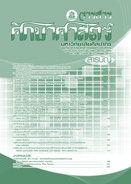การจัดบริการดูแลทางเลือกอย่างไม่เป็นทางการในรูปแบบครอบครัวทดแทน สำหรับเด็กต่างชาติที่ต้องพลัดพรากจากครอบครัว
Main Article Content
บทคัดย่อ
ผลการวิจัย พบว่า การดูแลทางเลือกอย่างไม่เป็นทางการในรูปแบบครอบครัวทดแทนของศูนย์มาริชมิชชั่น ระนอง อำเภอเมือง จังหวัดระนอง (Marist Mission Ranong) (MMR) อาสาสมัครครอบครัวทดแทนทั้งหมดเป็นเจ้าหน้าที่ของ MMR ซึ่ง MMR จะรับสมัครอาสาสมัครครอบครัวทดแทนและดำเนินการคัดเลือกอาสาสมัครครอบครัวทดแทนที่มีความรู้ ทักษะ ที่สอดคล้องกับสภาพปัญหาและความต้องการของเด็กต่างชาติที่ต้องพลัดพรากจากครอบครัว เนื่องจากอาสาสมัครของ MMR ที่เดินทางมาประเทศไทยบางคนมาในลักษณะครอบครัวหรือเดินทางมาคนเดียว เมื่อเป็นอาสาสมัครครอบครัวทดแทนทำให้โครงสร้างครอบครัวทดแทนมีหลากหลาย ได้แก่อยู่ร่วมกันเป็นครอบครัวมีทั้งพ่อแม่และเด็ก หรือมีเพียงพ่อหรือแม่กับเด็ก รวมทั้งการเช่าห้องแยกต่างหากสำหรับเด็ก สำหรับกฎระเบียบการอยู่ร่วมกันไม่ว่าจะเป็นการอาศัยในลักษณะใดเด็กและอาสาสมัครครอบครัวทดแทนจะร่วมกันวางกฎระเบียบในชีวิตประจำวัน การใช้จ่ายเงิน เป็นต้น
ทั้งนี้หน่วยงานหลักในการสนับสนุนรูปแบบดังกล่าวได้แก่ MMR มีบทบาทในฐานะ ผู้ประเมินอาสาสมัครครอบครัวทดแทน แรกรับเด็กต่างชาติที่ต้องพลัดพรากจากครอบครัว การประสานกับหน่วยงานภายนอกเพื่อเป็นที่ปรึกษาในการจัดบริการและร่วมเป็นเครือข่ายในการขับเคลื่อนรูปแบบครอบครัวทดแทน นอกจากนี้ยังรวมถึงการสร้างความเข้าใจและทัศนคติที่ดีของคนชุมชนคนไทยต่อเด็กต่างชาติ เป็นต้น
ข้อเสนอแนะจากการวิจัยประการหนึ่งคือศูนย์ฯควรมีการวางแผนจัดหาครอบครัวทดแทนในระยะยาว เนื่องจากครอบครัวทดแทนชาวพม่าไม่ได้อาศัยอยู่ประเทศไทยถาวรจึงทำให้มีการเปลี่ยนครอบครัวบ่อยและเด็กบางคนรู้สึกไม่มั่นคงในความรัก หรือรู้สึกว่าตนเองเป็นผู้สร้างภาระให้กับคนอื่น อันจะมีผลต่อพัฒนาการของเด็กในอนาคต นอกจากนี้ควรมีการจัดทำข้อมูล ความจำเป็น ข้อเสนอแนะเรื่องการดูแลทางเลือกอย่างไม่เป็นทางการสำหรับเด็กต่างชาติที่ต้องพลัดพรากจากครอบครัวเสนอเชิงนโยบายในหลากหลายช่องทางเช่นเสนอต่อคณะกรรมาธิการพัฒนาสังคมและกิจการเด็ก เยาวชน สตรี ผู้สูงอายุ คนพิการและผู้ด้อยโอกาส เพื่อเป็นกรอบในการขับเคลื่อนกฎหมายการดำเนินงานการดูแลทางเลือกต่อไป
Informal Alternative Care Service as Foster Care for Separated non-Thai Children
Many non-Thai children have been separated from their parents as their parents or relatives, for example, cannot protect them due to the death or poverty. Despite the adoption institutes and foster care provided in Thailand, there are no laws specifically enacted for the non-Thai children.These results in the difficulty of the access to the formal alternative care such as foster care. The informal alternative cares, established when the government services cannot satisfy the demands of the non-Thai children, are operated and provided by the social sectors such as Myanmar learning centers, non-government organizations. This article aims to study the informal alternative cares given to the separated non-Thai children in the format of foster care of Marist Mission Ranong Center located in Muang District, Ranong Province.
The research findings reveal that the informal alternative care provided as the foster care by Marist Mission Ranong (MMR) Center has been mainly operated by its officers. In addition, some volunteer foster families, having proper knowledge and skills in accord with the problems and demands of the separated non-Thai children, have been also recruited. As the volunteers of MMR came to Thailand alone or with their family, the structures of the foster families are various. For example, the separated non-Thai children may stay with the parents while some may stay with a father or a mother. No matter what the foster family style is, the separated non-Thai children and their volunteer foster family will settle the daily regulations together such as expenses, and so on. The foster care is mainly supported by MMR. MMR also evaluates the foster family volunteers, accepts the separated non-Thai children, coordinates with the external departments for the consultancy on the services, participate as the network promoting the foster care, and enhances the understanding and good attitudes of Thai people communities towards the non-Thai children.
It is suggested from the current research as follows: MMR should plan for the long-term foster family. As the Myanmar foster families do not permanently stay in Thailand, the separated non-Thai children have to change their foster family from time to time. As a result, such separated non-Thai children may feel instable and even think that they are the burden. This may cause problems and affect the development of such children. Hence, the data related to the necessity and recommendations on the informal alternative care services policy for the separated non-Thai children should be proposed in multi channels for example to the Committee on Social Development and Children, Youth, Women, the Elderly, the Disabled and the Underprivileged Affairs as the framework for further legal enactment on the alternative care services.


